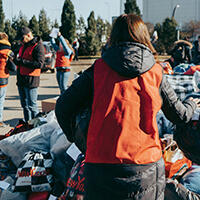 On Tuesday, April 12, three experts joined the Harvard Chan Humanitarian Development Student Association and the Temerty Contemporary Ukraine Program (TCUP) to discuss the humanitarian crisis caused by Russia’s invasion of Ukraine. Dr. Volodymyr Dubovyk and Dr. Elizabeth Cullen Dunn joined TCUP director Dr. Emily Channell-Justice to bring their perspectives from Ukraine and Poland.
On Tuesday, April 12, three experts joined the Harvard Chan Humanitarian Development Student Association and the Temerty Contemporary Ukraine Program (TCUP) to discuss the humanitarian crisis caused by Russia’s invasion of Ukraine. Dr. Volodymyr Dubovyk and Dr. Elizabeth Cullen Dunn joined TCUP director Dr. Emily Channell-Justice to bring their perspectives from Ukraine and Poland.
Channell-Justice began the event by explaining that Ukraine’s displacement crisis began in 2014, when Russia first invaded and occupied Crimea and the eastern parts of Donets’k and Luhans’k regions. Since 2014, Ukraine officially counted 1.5 million displaced people, although this number could be inaccurate and the status of displacement is itself contested. Dunn, however, argued that the current war and ensuing displacement crisis really began in 2008, when Russia invaded Georgia—the United Nations High Commissioner for Refugees (UNHCR) recognized 288,000 internally displaced people in Georgia and 3,000 refugees and asylum seekers as of September 2021.
All three experts agreed that the scale of the humanitarian crisis caused by Russia in 2022 is unprecedented. Dubovyk pointed out that Ukraine is currently not equipped for these large numbers of internal migration, and the current estimates of internally displaced people (IDPs) since February 2022—around 7 million people—are likely lower than reality. Dubovyk noted that people who have moved internally since February are not officially registered as IDPs and there is no mechanism in place to count how many people within Ukraine have been forced to flee. Further, Channell-Justice stated that many people who were forced to flee are not just internally displaced but may also be homeless, or their homes may be unsafe to return to. This creates many potential challenges for the Ukrainian government to deal with as internally displaced people flock to safer areas in the center and west of Ukraine.
Refugees—people fleeing the war who have crossed an international border—have flocked to Poland, with the country now hosting over 2.5 million Ukrainians. Dunn, who recently returned from Poland, described how the Polish response has been largely small-scale, volunteer-based humanitarian organizations. International organizations have been absent. Dubovyk agreed and added that local organizations and volunteers have been most effective on both sides of the border. Raising funds and channeling money to these organizations is much more effective than the funding systems of large international organizations such as the International Organization of Migration (IOM).
Dunn concurred, mentioning the fact that with large organizations, only 37 cents of each donated dollar actually reaches people in need. She described the “flash appeal system” that most large organizations use. Rather than keeping funds in reserve, they raise money on the spot for a given crisis and then distribute those funds to specific projects. When those projects are over, then the funding is over, and organizations spend excessive time and resources on documenting what the money has been spent on. Furthermore, these organizations largely target refugees, leaving internally displaced people’s needs unmet.
In discussing the issue of people’s return to Ukraine, the experts agreed that the situation is fluid and we must apply a long-term time frame. Channell-Justice pointed out that there are currently large numbers of refugees and internally displaced people returning to Ukraine and to the cities they fled from, but that in the long term, people will go where they have jobs and housing. Dunn reminded listeners that there were already some 1.8 million Ukrainians working legally in Poland before the war. She agreed that people who can get better jobs in Europe might be less inclined to return to Ukraine, although limited and expensive housing in Europe might push them back. Dubovyk added that the situation could change overnight depending on what Russian forces do, and that people will prioritize their own physical safety.
The speakers discussed state responses on both sides of the border. Dubovyk noted that the Ukrainian government is doing their work reasonably well given the circumstances. He called Ukraine the opposite of a failed state—Russia expected Ukraine would quickly collapse, but people are coming together instead. Yet Ukraine still needs aid from international organizations and there are many delays while they decide what to do. From the Polish side, Dunn mentioned that the government gave Ukrainian refugees cash benefits and PESEL numbers (akin to the US social security number), which allows them to work in Poland and access health care and other resources.
When addressing the question of what can be done to improve the current situation and what international organizations should be doing, Dunn clearly stated that the best way to help is to channel money directly to the volunteer response in Poland. These internet-mediated, self-organized groups can get aid to people in need more quickly and more effectively. Sending cash through these existing pathways gets people exactly what they need. Furthermore, cash transfers give people agency and the dignity to make their own decisions, compared to non-monetary aid, such as clothing donations, which can be demoralizing and dehumanizing.